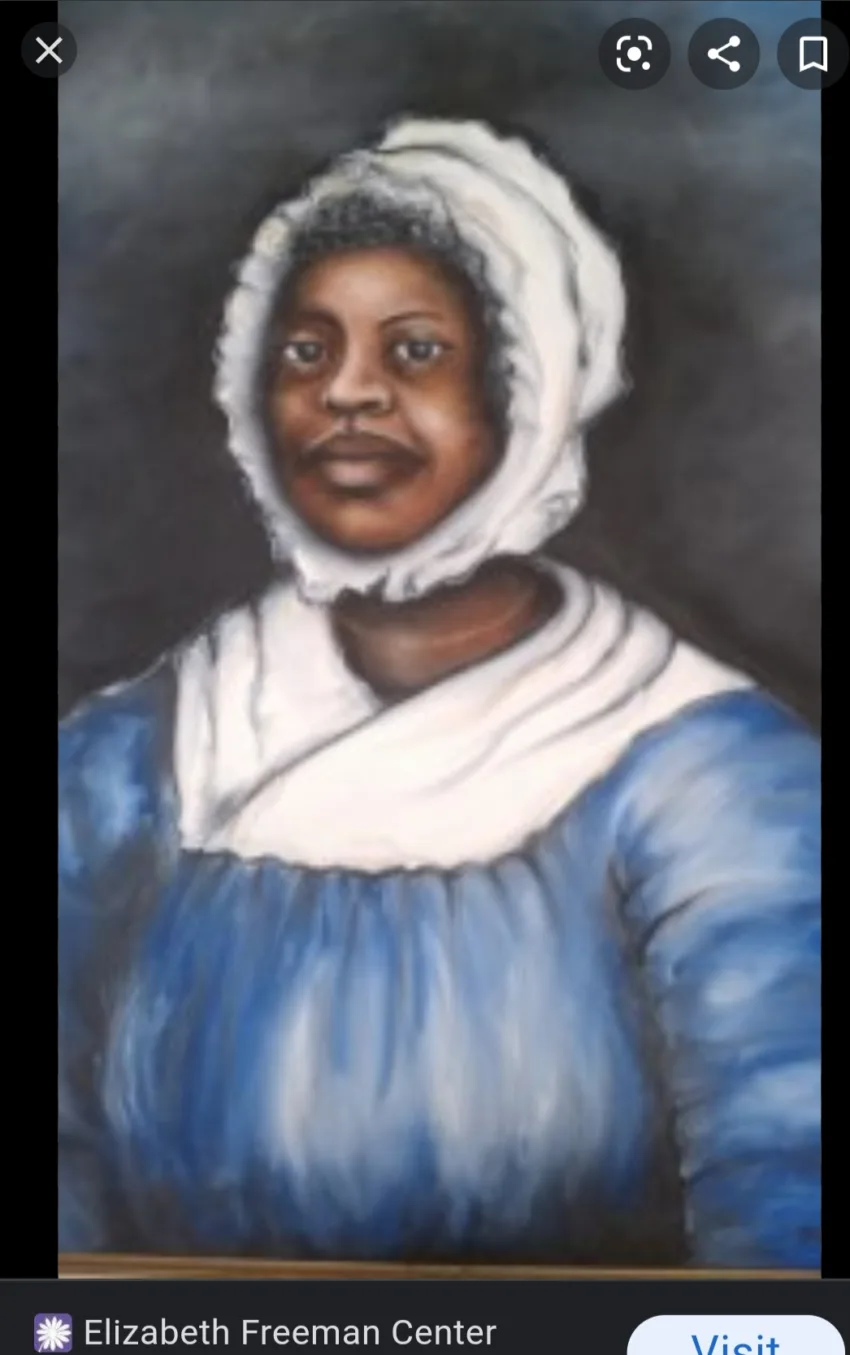1197: Elizabeth Freeman
The First Black Slave to File and Win a Freedom Suit in Massachusetts
Born: c.1744, Claverack, The Colony of New York (Present-day Claverack, New York, United States of America)
Died: 28 December 1829, Stockbridge, Massachusetts, United States of America
Original Name: Mum Bett
Elizabeth’s case was titled Brom and Bett v Ashley and took place in 1781, less than a year after Massachusetts ratified their state constitution. Her case served as the precedent for the later abolishment of slavery in Massachusetts.
Elizabeth (known as Mum Bett at the time) grew up on a plantation with her sister Lizzie. When her owner’s daughter got married, he gifted Elizabeth and her sister to the new couple as part of their own estate. (Although it should be noted that some sources say Elizabeth’s new owners were actually married years before Elizabeth was born, and that she was sent to live with them when she was very young even though they had already been married for several years). It was during her time at the new home that Elizabeth gave birth to a baby girl she named Elizabeth, but she never revealed the child’s father, only said that he had died during the Revolutionary War.
Elizabeth was not able to read or write, but she was far from stupid, and she was proud and determined. Evidently her new owners were cruel to the slaves. Once, when her female owner tried to hurt Elizabeth’s sister by hitting her over the head with a hot shovel, Elizabeth interfered and blocked the blow with her arm. The wound never fully healed, and Elizabeth refused to cover it either, letting the world bear witness to her mistreatment.
Elizabeth’s male owner was a local judge, revolutionary patriot, and politician. It is believed that Elizabeth overheard her owner’s discussions on freedom and equality. He eventually helped draft a declaration that stated mankind in their natural state are free, independent, and equal of one another. It also stated people, “have a right to the undisturbed enjoyment of their lives, their liberty and property.” (Sheffield Declaration, 1773).
After the adoption of the Declaration, Elizabeth and another slave named Brom began the fight for their freedom based on the declaration’s language (the same language was also later used in the Massachusetts state constitution, and the Declaration of Independence). When the Massachusetts state constitution was adopted in 1780, Elizabeth learned that the inspiring words she had heard seven years earlier in the Sheffield Declaration were now the law of the land in which she lived.
In May of 1781, Elizabeth’s attorney filed a document with the Berkshire Court of Common Pleas, suing for Elizabeth and Brom’s freedom. The reason why Brom was included in the proceedings is unclear, but some historians speculate that Elizabeth’s attorney added a male slave to his case so that it would not be dismissed for only pertaining to a female (that’s right, sexism was alive and well in the late 1700s in case you forgot!). The court sided with the slaves, stating they were not the legitimate property of their current owner, however, he refused to abide by the ruling and release them.
In August, the case moved on to the County Court of Common Pleas of Great Barrington. Elizabeth’s attorney argued that the wording of the Massachusetts state constitution clearly outlawed slavery, and the jury agreed. Elizabeth and Brom were not only granted their freedom, but they were also awarded thirty shillings each plus the cost of the court proceedings. Initially, Elizabeth’s (now former) owner filed an appeal, but he dropped the case a few months later.
After being set free, Elizabeth changed her name from Mum Bett to Elizabeth Freeman. Her former owner asked her to be a member of his staff as a paid servant on several occasions, but she always refused. Elizabeth instead became a paid domestic worker for her attorney.
Elizabeth also worked as a midwife, healer, and nurse to her community. After twenty years of hard work, Elizabeth was able to purchase her own home where she lived with her children.
Because Elizabeth was illiterate, most of the details of her life are not concrete facts, outside of her court case. Everything we know of Elizabeth’s life was written secondhand, either by people who claimed to know her or by historians who lived after her. The biggest source of information from close to Elizabeth’s time period comes from Catharine Maria Sedgwick, the daughter of Elizabeth’s attorney and an author in her own right, who described Elizabeth’s life story in an essay on slavery.
In 1974, The Elizabeth Freeman Center opened in Massachusetts to provide help and support to those impacted by domestic and sexual abuse in Berkshire County, where Elizabeth used to live.
Elizabeth was quoted as saying:
“While I was a slave, if one minute’s freedom had been offered to me, and I’d been told I must die at the end of that minute, I would have taken it—just to stand one minute on God’s earth a free woman.”
Badges Earned:
Find a Grave Marked
Located in My Personal Library:
Uppity Women Speak Their Minds by Vicki Leon
Founding Mothers by Cokie Roberts
Sources:
https://www.womenshistory.org/education-resources/biographies/elizabeth-freeman
https://elizabethfreeman.mumbet.com
https://elizabethfreemancenter.org/who-we-are/about-us/
https://www.findagrave.com/memorial/16476373/elizabeth-freeman

